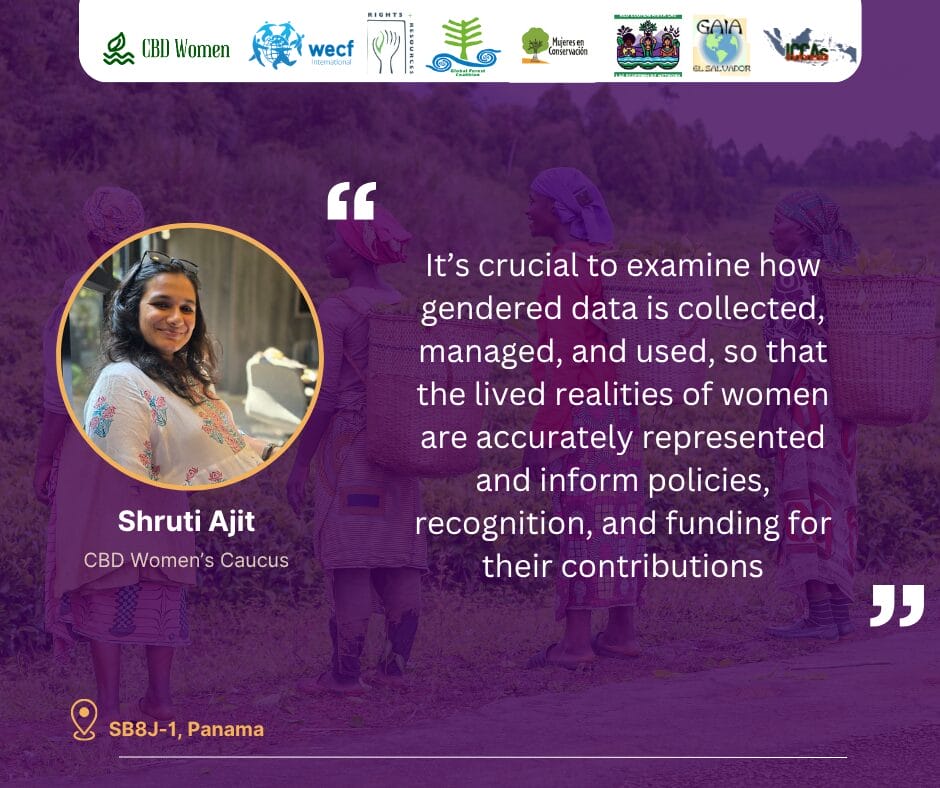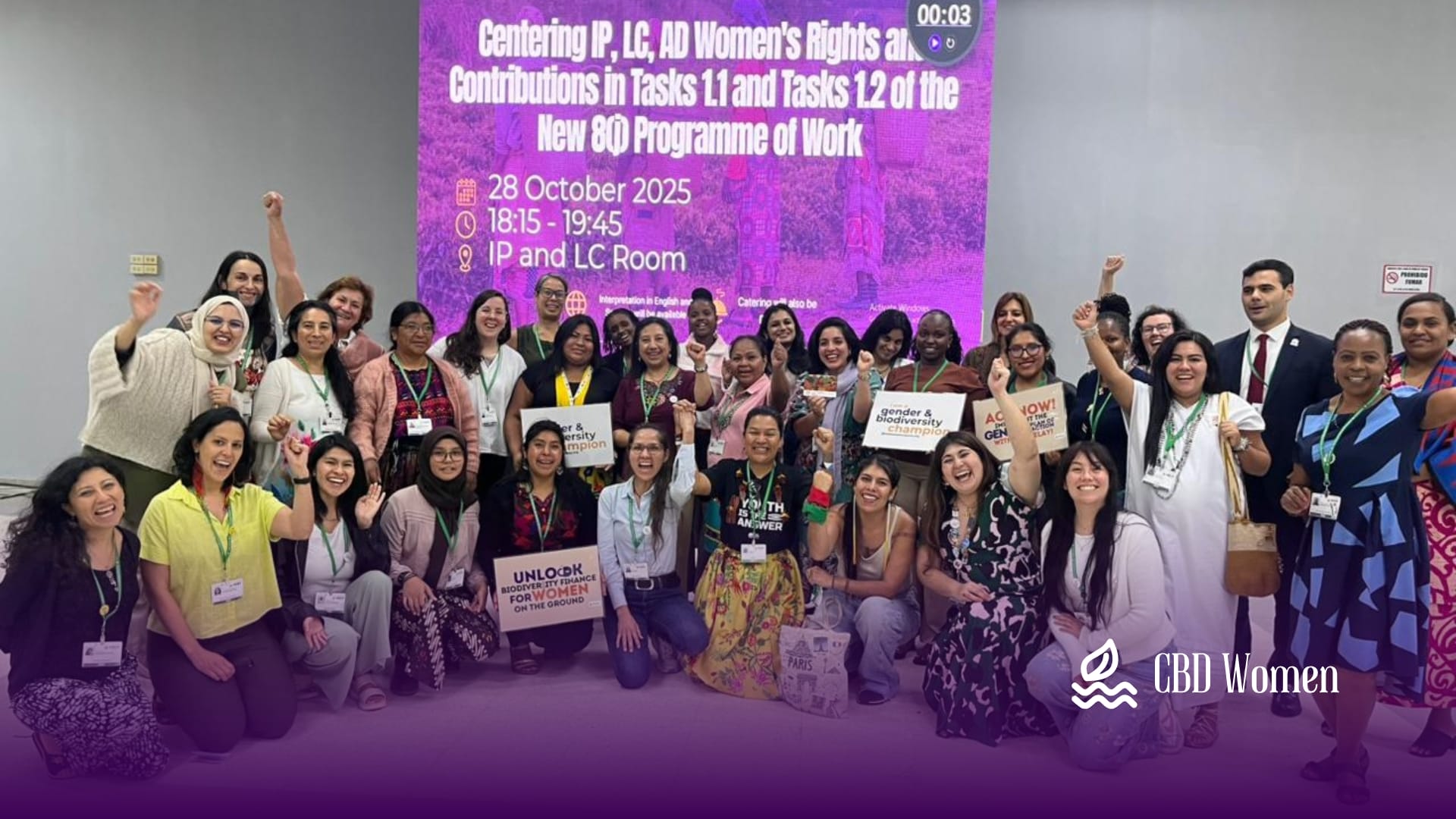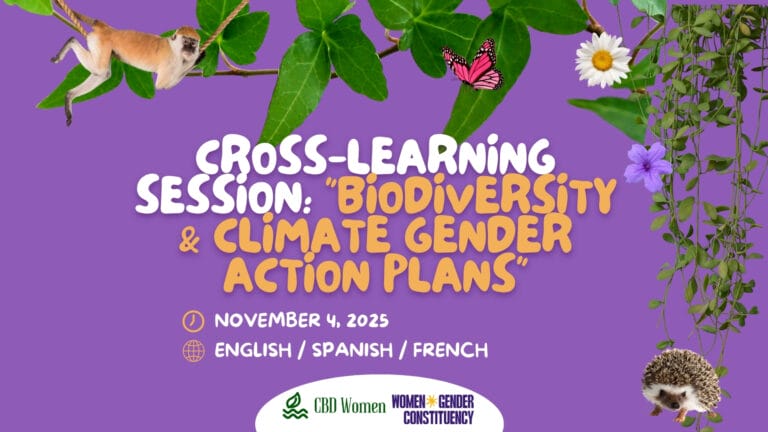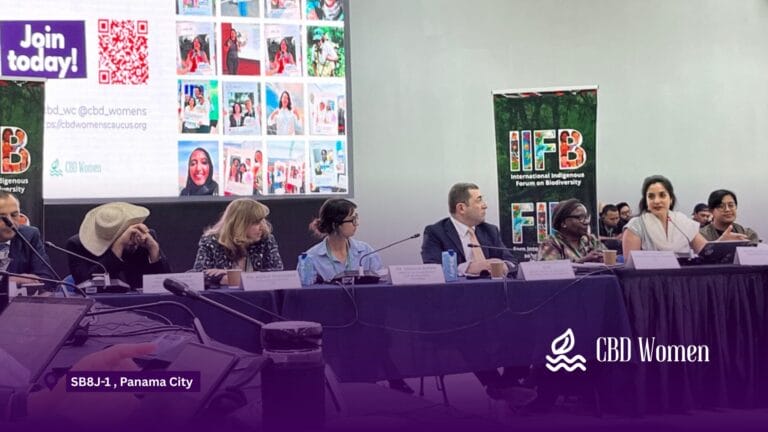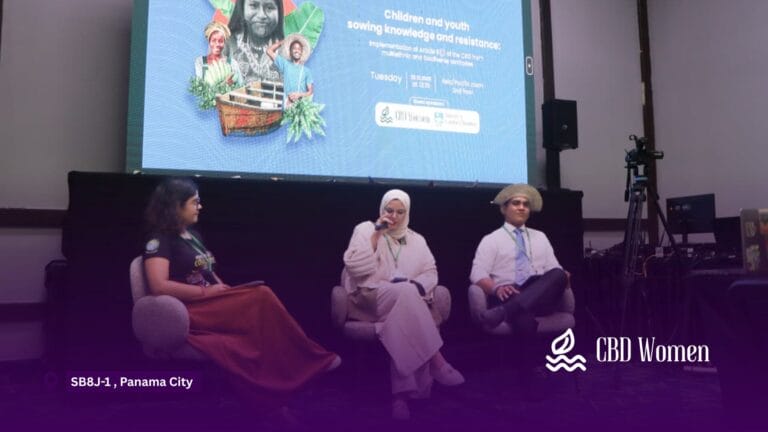At the margins of the Convention on Biological Diversity (CBD) discussions, the CBD Women’s Caucus hosted a dynamic session focusing on the leadership of Indigenous women in conservation, restoration, and spatial planning. The session brought together women leaders, researchers, and practitioners from across regions to share experiences, identify challenges, and offer recommendations for inclusive and gender-responsive biodiversity action.
Speakers underscored a shared message: Indigenous and rural women are not beneficiaries of conservation—they are knowledge keepers, defenders, and leaders whose wisdom sustains biodiversity and communities alike.
Ms. Edith Magnolia Bastidas Calderón: Centering Women in Biodiversity Governance
Ms. Edith Magnolia Bastidas shared her experience working with Colombia’s Ministry of Environment to mainstream gender across biodiversity and the National Biodiversity Strategy. She noted that women’s participation, particularly that of Indigenous women, has historically been limited, and that efforts must be adapted to their diverse contexts and realities.
Ms. Edith emphasized that addressing gender-based violence, cultural discrimination, and the exclusion of Indigenous women is essential for equitable participation. She called for stronger collaboration between the Ministry of Equality and environmental agencies to ensure policy coherence, placing women at the heart of biodiversity governance. Her message was clear: a truly inclusive biodiversity framework must reflect intersectional approaches and prioritize women’s leadership.
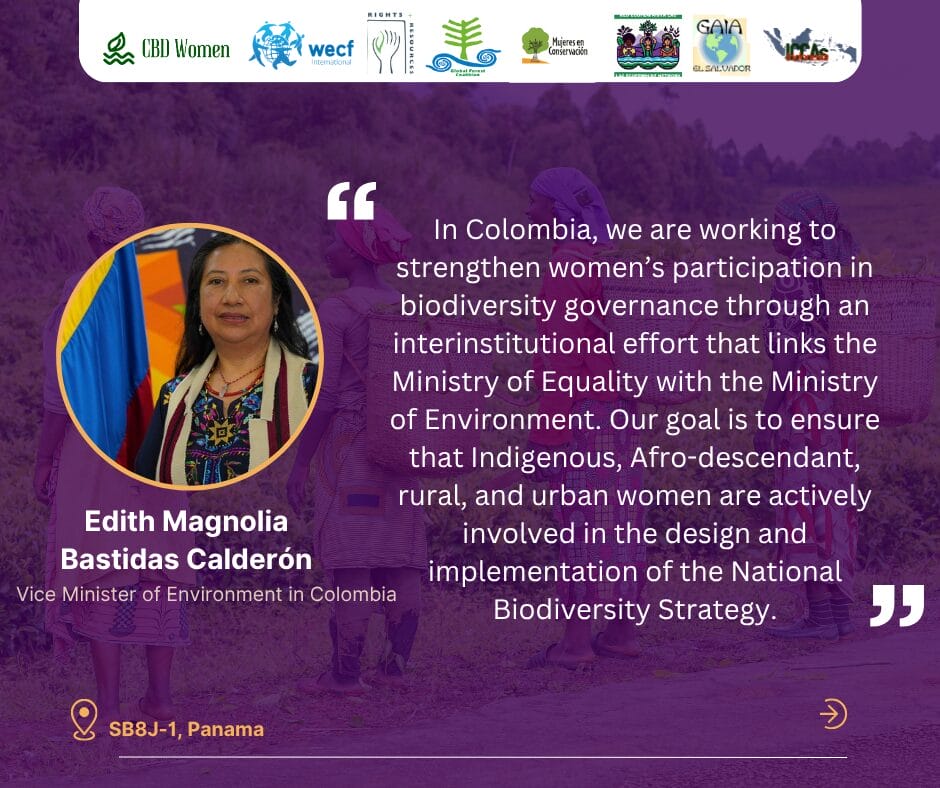
Ms. Daniela Soto Pito : Conservation as a Cultural and Spiritual Process
From Colombia, Ms. Daniela Soto Pito, a specialist in protected areas, spoke passionately about the unique and indispensable knowledge that Indigenous women contribute to conservation and restoration. She reminded participants that biodiversity work must go beyond science—it is also a socio-cultural and spiritual process, deeply connected to women’s traditional roles and the well-being of their communities.
She urged governments to guarantee women’s access to land and natural resources, support their entrepreneurship, and recognize their status as defenders and custodians of their territories. Ms. Daniela shared the moving symbolism of Indigenous practices, such as the burial of a woman’s placenta within her family’s land—a lifelong connection between women, land, and the cycles of life. Her call was clear: embed cultural values and women’s knowledge systems into all restoration and conservation strategies.
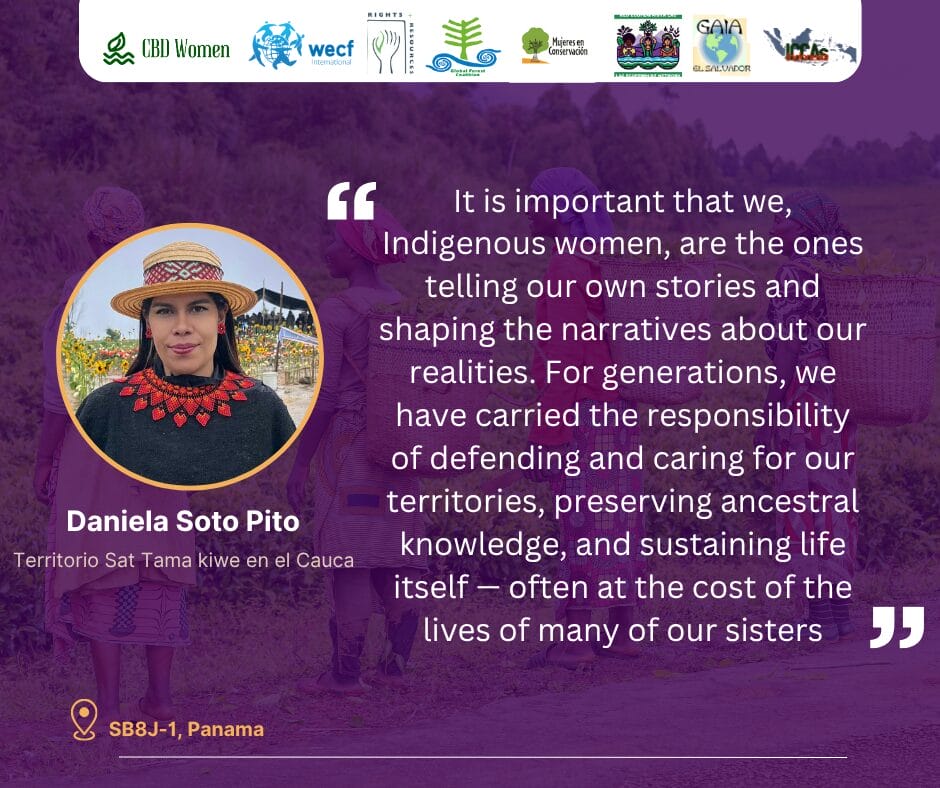
Ms. Sara Omi (Emberá People, Panama): Indigenous Women as Rights-Holders
Representing the Emberá people of Panama, Ms. Sara Omi highlighted the persistent challenges Indigenous women face both within and beyond their territories. She called for policy recognition of Indigenous women as rights-holders and key actors in biodiversity planning, rather than as passive participants.
Sara stressed that traditional knowledge is foundational to biodiversity conservation, yet women’s contributions often go unrecognized or unsupported. She urged governments and donors to provide direct funding and mechanisms for Indigenous women’s engagement, emphasizing that inclusion is essential for just and sustainable restoration.
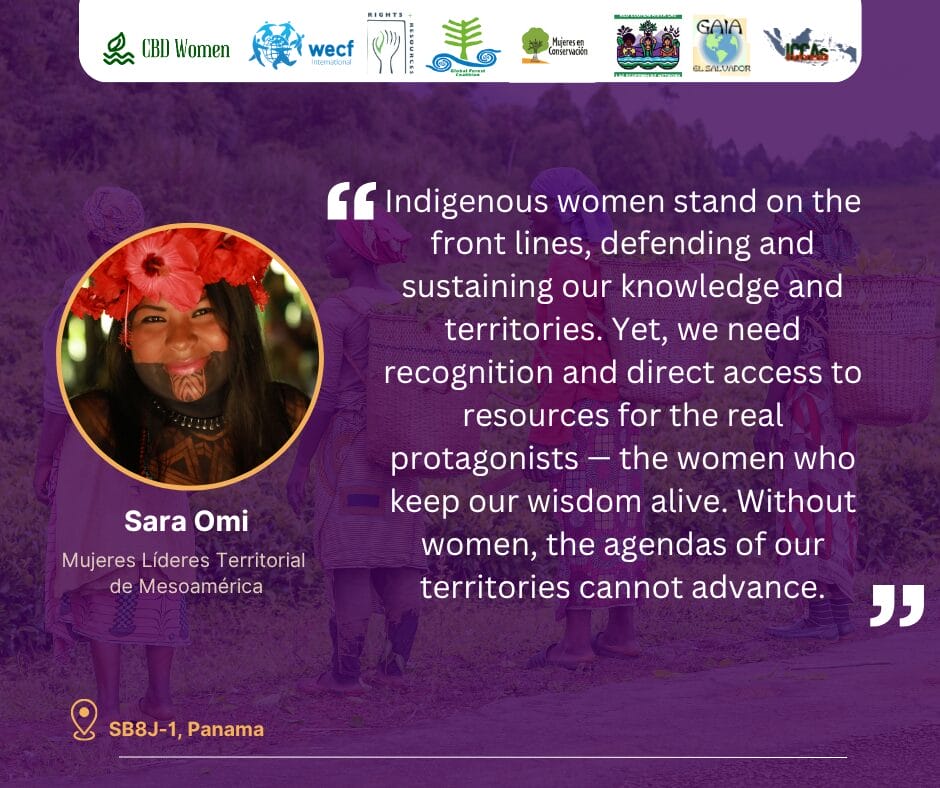
Ms. Silole Malih, IMPACT: Transforming Governance in Northern Kenya
From northern Kenya, Ms. Silole Malin, a Maasai pastoralist woman, spoke about the critical yet often invisible role of pastoralist women in managing land, livestock, and water resources. Despite laws supporting women’s land rights, cultural norms still restrict their ownership and decision-making power.
Ms. Silole described inspiring progress: through training and awareness efforts, women have begun participating in community meetings—spaces once reserved for men—and now actively contribute to land and restoration planning. Women’s local knowledge of grazing areas and water points has improved resource management, strengthened governance, and enhanced resilience during droughts.
Her message was empowering: when women are recognized as equal partners, communities thrive, governance becomes fairer, and restoration efforts are more successful.
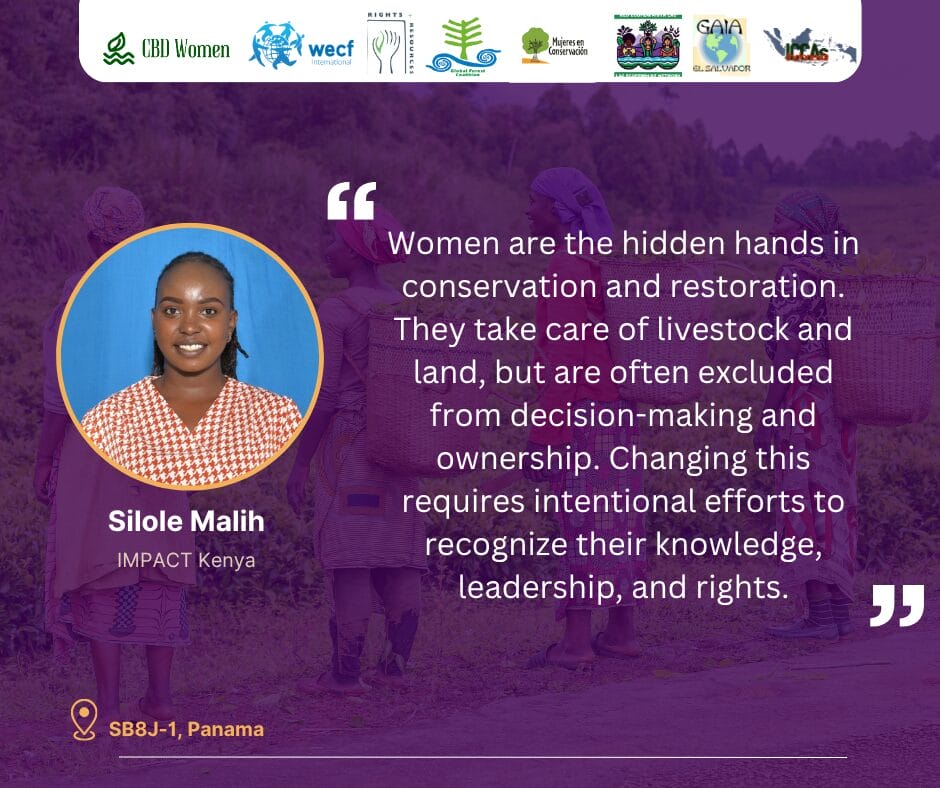
Ms. Alumita Sekinairai It Akuei: Bridging Cultural Knowledge and Restoration Practice
Ms. Alumita Sekinairai It Akuei spoke powerfully about the patriarchal structures that continue to limit Indigenous women’s participation in land and natural resource governance. She emphasized that ecosystem restoration and resource management are not merely technical processes but deeply cultural ones, rooted in the traditional knowledge that women hold and pass on.
She called on governments and organizations to ensure Indigenous women are fully consulted and represented in conservation and planning processes, and to recognize both customary and scientific knowledge as equally valuable. Alumita also highlighted the importance of data sovereignty, ensuring that Indigenous women maintain control over how their ecological knowledge is used. Her recommendations focused on capacity-building, collective solidarity, and direct support for women-led initiatives—critical pathways for inclusive restoration, resilient communities, and stronger food and resource security.
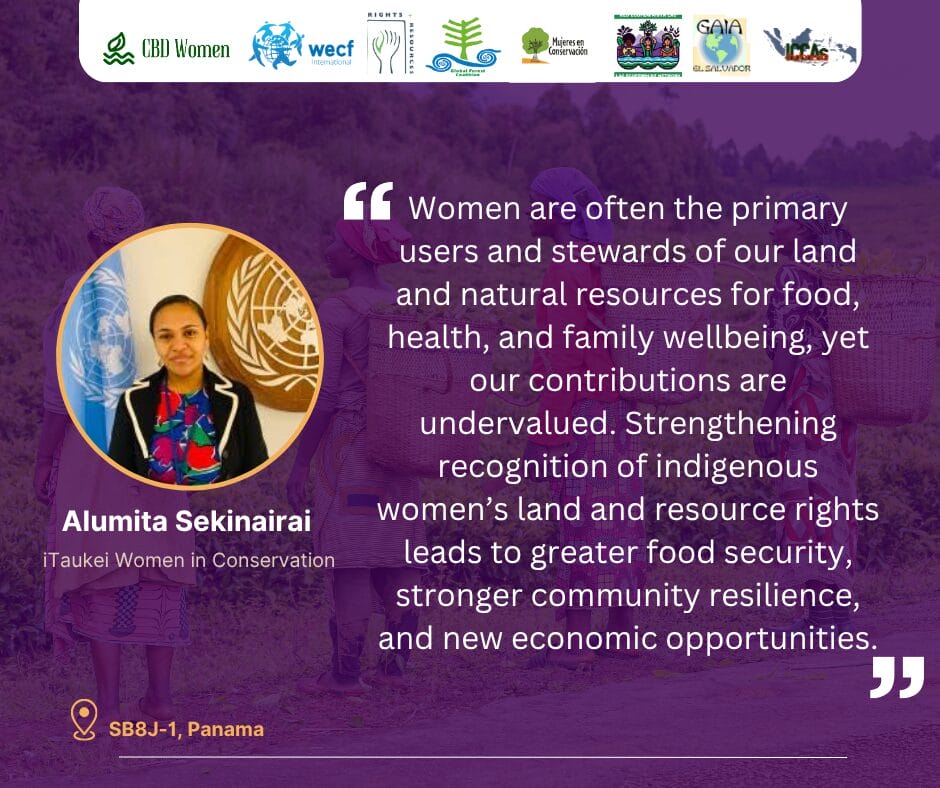
Ms. Mega Ayu Lestar, ICCAs Indonesia: Research Proving the Power of Indigenous Women’s Knowledge
From Indonesia, researcher Ms. Mega Ayu Lestari shared insights from studies on Indigenous and Community Conserved Areas (ICCAs) that integrate gender perspectives into biodiversity management. She highlighted that financial mechanisms often fail to meet Indigenous women’s needs or support their participation in local decision-making.
Ms. Mega emphasized the importance of being “stubborn optimists” in the face of long-standing challenges and external threats, such as mining projects, and stressed the need to build supportive environments where communities can thrive together. Her research shows that women’s knowledge is central to conservation and can be integrated into community-based strategies, providing practical input for policies. She underlined that recognition, direct support, and empowerment of Indigenous women’s knowledge, rights, and leadership are essential for effective and equitable conservation outcomes.

Ms. Shruti Ajit, CBD Women’s Caucus: Building Evidence for Inclusive Action
Closing the session, Shruti from the CBD Women’s Caucus addressed the need for stronger evidence and data to explain why women’s participation in biodiversity processes remains limited. She announced the ongoing assessment led by the Caucus to map gaps, strengths, and opportunities in women’s engagement across regions.
Shruti invited participants to take part in this effort, noting that understanding these gaps is essential to shaping inclusive biodiversity policy and ensuring women’s priorities are reflected in future CBD processes. Her concluding message captured the spirit of the event.
Link to the survey » Advancing Gender Justice in Biodiversity Data and Policy»
